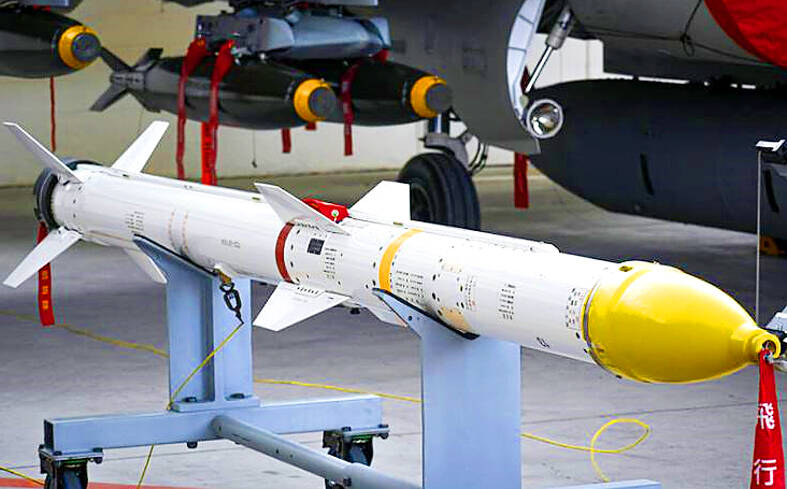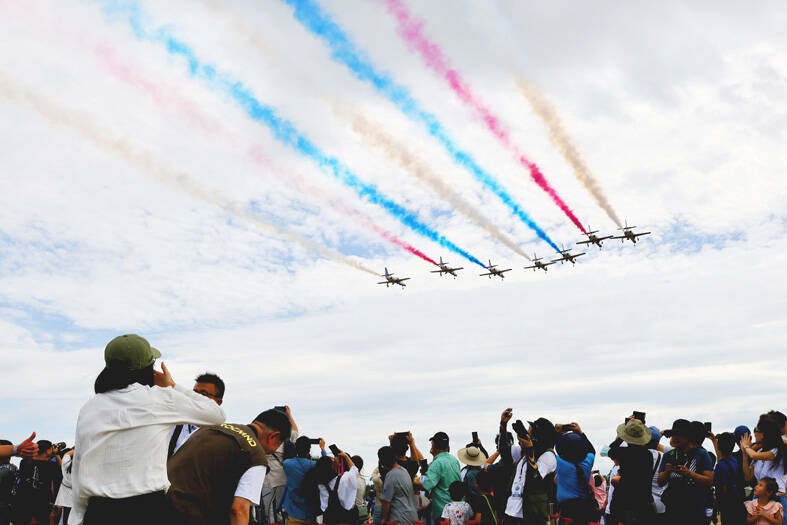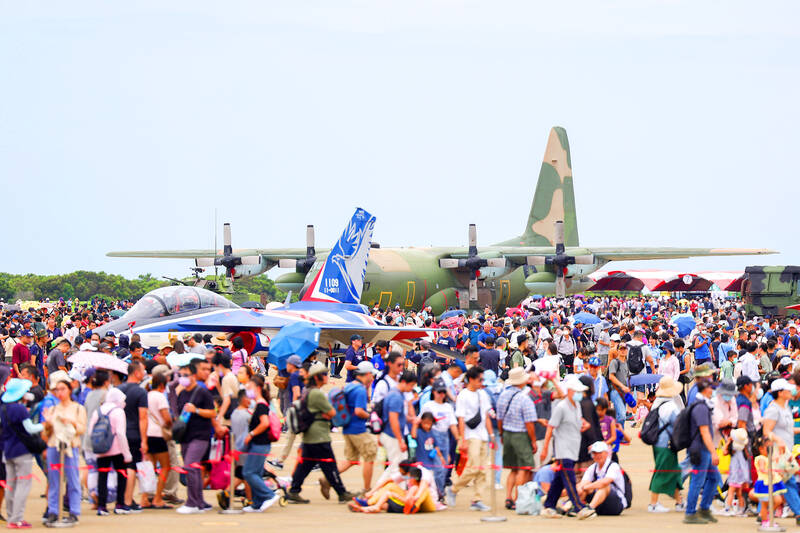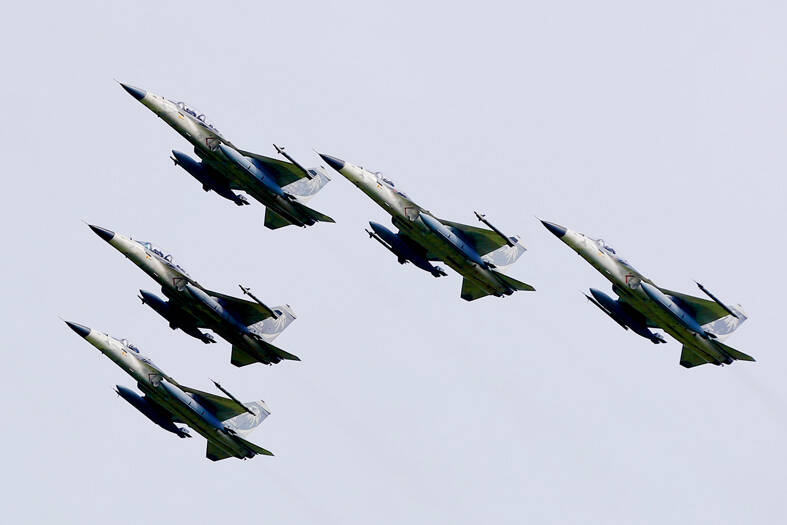The air force’s proposed next-generation fighter jet is to be armed with a new Tien Chien missile to be developed by the Chungshan Institute of Science and Technology, a high-ranking defense official said yesterday.
The missile, tentatively named Tien Chien V, is to have a range of 160km, equivalent to the US-made AIM-120C-8, the official said, speaking on condition of anonymity.
The weapon is based on the Tien Chien II medium-range air-to-air missile, they added.

Photo: Liu Yu-chieh, Taipei Times
Tien Chien V missiles would be compatible with domestically made joint helmet-mounted cueing systems and have improved anti-jamming capabilities, which would enhance the speed of target acquisition and pilots’ ability to counter enemy electronic warfare, the source said.
The new missile is needed to meet the next-generation fighter’s operational requirements and design parameters, as the air force has specified that the jet must utilize an internal weapons bay to enable stealth capabilities, they said.
The jet might incorporate vector thrust and advanced avionics, including active electronically scanned array radar and a tactical data link, they said, adding that the air force has yet to make a final decision on the platform’s capabilities.

Photo: Ritchie B. Tongo, EPA-EFE
The Chungshan Institute makes the Tien Chien I short-range air-to-air missiles and the medium-range Tien Chien II, in addition to the latter’s ship-launched and ground vehicle-mounted derivatives, which it refers to as Tien Chien III, the official said.
The developers skipped the name Tien Chien IV, they said.
Separately, President Tsai Ing-wen (蔡英文) yesterday said that a Ching Chuan Kang Air Base “open house” event in Taichung was intended to educate Taiwanese about the armed forces’ achievements in preparing the nation’s defense.

Photo: CNA
In a post on Facebook, Tsai called for support and appreciation for military service members.
After a three-year hiatus of the air shows due to the COVID-19 pandemic, this year’s open house featured a demonstration by the Thunder Tigers Aerobatics Team, a showcase of the military’s main combat aircraft, military band performances and displays that included nearly 100 stands.
Taiwan’s domestically designed AIDC T-5 Brave Eagle trainer jets conducted a flyover in a formation of five, marking a first for that type of aircraft.

Photo: Ritchie B. Tongo, EPA-EFE
Lockheed Martin F-16Vs, Dassault Mirage 2000s and AIDC Indigenous Defense Fighters were among the other tactical aircraft that carried out aerial demonstrations at the event.
The army and the navy, which also participated in the event, displayed vehicles and weapons systems currently in service, including the Boeing AH-64 Apache attack helicopter, Sikorsky UH-60 Black Hawk helicopter, armored fighting vehicles, Hsiung Feng II and Hsiung Feng III missiles, and the Chungshan Institute-developed Albatross drone and Cardinal uncrewed combat aerial vehicle.

Intelligence agents have recorded 510,000 instances of “controversial information” being spread online by the Chinese Communist Party (CCP) so far this year, the National Security Bureau (NSB) said in a report yesterday, as it warned of artificial intelligence (AI) being employed to generate destabilizing misinformation. The bureau submitted a written report to the Legislative Yuan in preparation for National Security Bureau Director-General Tsai Ming-yen’s (蔡明彥) appearance before the Foreign Affairs and National Defense Committee today. The CCP has been using cognitive warfare to divide Taiwanese society by commenting on controversial issues such as Taiwan Semiconductor Manufacturing Co’s (TSMC, 台積電) investments in the

INVESTIGATION: The case is the latest instance of a DPP figure being implicated in an espionage network accused of allegedly leaking information to Chinese intelligence Democratic Progressive Party (DPP) member Ho Jen-chieh (何仁傑) was detained and held incommunicado yesterday on suspicion of spying for China during his tenure as assistant to then-minister of foreign affairs Joseph Wu (吳釗燮). The Taipei District Prosecutors’ Office said Ho was implicated during its investigation into alleged spying activities by former Presidential Office consultant Wu Shang-yu (吳尚雨). Prosecutors said there is reason to believe Ho breached the National Security Act (國家安全法) by leaking classified Ministry of Foreign Affairs information to Chinese intelligence. Following interrogation, prosecutors petitioned the Taipei District Court to detain Ho, citing concerns over potential collusion or tampering of evidence. The

‘COMPREHENSIVE PLAN’: Lin Chia-lung said that the government was ready to talk about a variety of issues, including investment in and purchases from the US The National Stabilization Fund (NSF) yesterday announced that it would step in to staunch stock market losses for the ninth time in the nation’s history. An NSF board meeting, originally scheduled for Monday next week, was moved to yesterday after stocks plummeted in the wake of US President Donald Trump’s announcement of 32 percent tariffs on Taiwan on Wednesday last week. Board members voted to support the stock market with the NT$500 billion (US$15.15 billion) fund, with injections of funds to begin as soon as today. The NSF in 2000 injected NT$120 billion to stabilize stocks, the most ever. The lowest amount it

NEGOTIATIONS: Taiwan has good relations with Washington and the outlook for the negotiations looks promising, Minister of Economic Affairs J.W. Kuo said Taiwan’s GDP growth this year is expected to decrease by 0.43 to 1.61 percentage points due to the effects of US tariffs, National Development Council (NDC) Minister Paul Liu (劉鏡清) said at a meeting of the legislature’s Economics Committee in Taipei yesterday, citing a preliminary estimate by a private research institution. Taiwan’s economy would be significantly affected by the 32 percent “reciprocal” tariffs slapped by the US, which took effect yesterday, Liu said, adding that GDP growth could fall below 3 percent and potentially even dip below 2 percent to 1.53 percent this year. The council has commissioned another institution